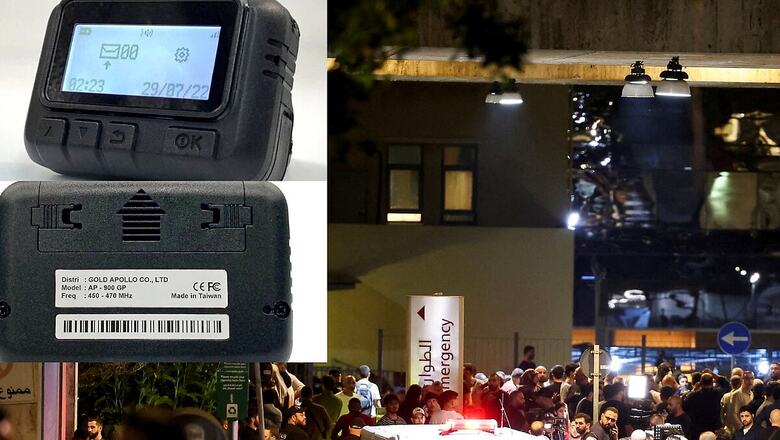
views
The world was left awestruck last month when the thousands of booby-trapped Hezbollah pagers and hundreds of radios exploded, killing dozens of people linked to the Iran-backed group. The attacks were widely blamed on Israel and were said to be part of an audacious intelligence operation.
According to a report published in The Washington Post, Israel’s Mossad stealthily introduced the pagers into the ranks of Hezbollah, ensnaring the Iran-backed militia in a deadly trap and marking a turning point in the Middle East conflict.
Two years ago, Mossad identified a potential vulnerability within Hezbollah, a group with a strong reputation for secrecy and paranoia. They targeted Hezbollah’s need for secure communication, offering a solution that seemed tailor-made for their needs.
Tailor-made for Hezbollah
The AR924 pager, slightly bulky yet rugged, was designed to withstand harsh battlefield conditions, according to WAPO. With a waterproof design and an oversized battery lasting months without charging, these pagers offered Hezbollah a reliable way to communicate without the fear of interception by Israeli intelligence.
Little did Hezbollah know that the devices were equipped with explosives, turning them into lethal traps for their users. In February, Hezbollah leaders purchased 5,000 of these pagers, distributing them among mid-level fighters and support personnel. Users had no idea that they were carrying what would ultimately become Israeli bombs.
Unprecedented act of espionage
On September 17, the operation reached its climax. Mossad remotely triggered the pagers, resulting in an explosion that killed or injured as many as 3,000 Hezbollah members, primarily those who were not in frontline combat roles. This unprecedented act of espionage has been described by experts as one of the most inventive penetrations of an enemy by an intelligence service in recent history.
Details about the operation, including its planning and execution, have slowly come to light through interviews with Israeli, US, and Middle Eastern officials familiar with the events. The operation, which had been in the works for years, involved a web of operatives and accomplices across multiple countries.
The pagers were sold to Hezbollah through a marketing official with connections to a Taiwanese company that manufactured them. This individual, unaware of the true nature of the operation, marketed the AR924 as the ideal communication tool for Hezbollah. Last year, Hezbollah received unsolicited offers for the pagers, which bore no links to Israeli interests.
Booby-trapped walkie-talkies
Mossad had previously infiltrated Hezbollah using booby-trapped walkie-talkies, which they began inserting into Lebanon in 2015, according to WAPO. These devices allowed Israeli intelligence to eavesdrop on Hezbollah communications, keeping tabs on the group’s activities for nearly a decade. With the introduction of the pagers, Mossad took the operation a step further, creating a deadly Trojan horse.
The AR924 pagers included a unique feature: a hidden explosive concealed within the battery pack. This design was so sophisticated that it could not be detected even if the device was disassembled. The pagers also contained a two-step encryption process that required users to hold the device with both hands, ensuring they would be injured or incapacitated when the device detonated.
According to the Washington-based newspaper, the decision to activate the devices came during a tense meeting on September 12, when Israeli Prime Minister Benjamin Netanyahu convened his intelligence advisers to discuss potential actions against Hezbollah. While acknowledging the risks of a retaliatory strike from Hezbollah or even Iran, Mossad argued that the operation offered an unprecedented opportunity to destabilize Hezbollah.
Approved by Israeli PM
Ultimately, Netanyahu approved the plan, allowing Mossad to proceed with detonating the pagers at a time that would maximize their impact. Within days, pagers began vibrating or ringing across Lebanon and Syria, displaying the ominous message: “You received an encrypted message.” As Hezbollah operatives followed the instructions to check the messages, explosions erupted in homes, shops, and streets.
The following day, hundreds of previously placed walkie-talkies also detonated, compounding the chaos and confusion among Hezbollah’s ranks. Israeli airstrikes soon followed, targeting Hezbollah’s leadership and logistical centers. The culmination of these attacks led to the death of Hezbollah chief Hasan Nasrallah last month.
The implications of this operation extend beyond the immediate casualties. Following the strikes, Iran launched approximately 180 missiles toward Israel in retaliation for the attacks on Hezbollah’s leadership. Iranian Supreme Leader Ali Khamenei warned that “the resistance in the region will not back down,” signaling a potential escalation of conflict.
In the wake of the operation, Israeli leaders appear emboldened, viewing Hezbollah as weakened and vulnerable. They now believe a systematic dismantling of the group is possible through continued airstrikes and ground invasions. However, the successful attack on Hezbollah has also raised the specter of a wider regional conflict involving Iran.
This remarkable “Israeli” operation, which was kept secret from key allies, has opened a new chapter in the ongoing conflict between Israel and Hezbollah. As both sides assess the fallout, the world watches closely, fearing a potential escalation in the already fragile Middle East.


















Comments
0 comment